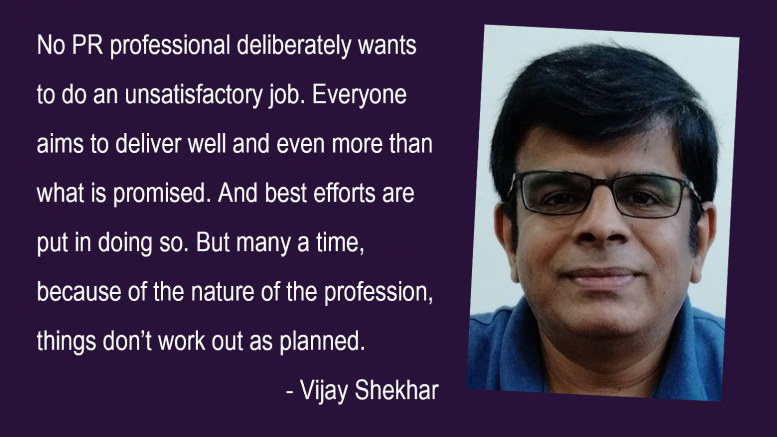“Ours is the most thankless profession.”
Over the decades, the above line has been felt and / or mouthed by Public Relations practitioners every now and then.
Where does the Thanklessness stem from?
It’s general human nature to complain more and praise less. When we have a great ride through an app based cab aggregator or have a great experience at a restaurant, we are happy but generally less inclined to immediately post a positive review unless prompted by the product / service provider. But when we have a bad or not so great experience, we make it a point to bring it out to the product / service provider and also the general public at the earliest.
This culture is very much prevalent in the PR business too, wherein complaints are galore when things go wrong…but when things work out fine or even more than fine, there is very little or no thankfulness.
In any contemporary study or research on the world’s most stressful jobs, a PR professional’s job is sure to feature among the top 10 stressful jobs… maybe even among the top 5. Even in India, we see a lot of perpetual stress in client – consultancy relationships and within a firm, in subordinate – superior relationships. On the surface, it all looks calm and cool…there are smiles and handshakes all around. But beneath the pleasantries, there lies that permanent (quite) ‘this wasn’t delivered’ grouse. And past successes and good works mean very little in the business…it’s even said that your last goof up and / or the latest failure is what defines you as a PR professional.
The prime reason for the thankless nature of the PR profession is the fact that one cannot expect input A to surely result in output B. Sometimes it may result in output B, which is well and good. Sometimes it may even surprisingly exceed B. And many a time, it could result in lesser than output B. In India, whether we agree or not, PR is still largely media centric. A 2-page press release on a product or service may result in just a small snippet or even no coverage in a particular Cat A publication, while an ad on the same product or service may get a full page in the same publication. This happens because the space for the ad is paid for, whereas the space on which the editorial coverage appears is not. This is an aspect which many don’t understand or choose not to understand, leading to a culture of thanklessness.
Beating Thanklessness with Thankfulness
What’s the opposite of ‘Thanklessness’? The simple answer to this is ‘Thankfulness’. Now let’s look at this from a problem and solution perspective, wherein ‘Thanklessness’ is the problem ailing the business and ‘Thankfulness’ the solution which can bring about a substantial amount of feel-good factor in any PR professional’s life.
So why not bring in a culture of thankfulness in the business? It’s not easy, but it’s doable. We cannot expect media persons to thank a PR consultancy professional or a Corporate Communications professional for giving them a good story. We cannot expect clients to praise consultancy personnel every now and then. In such a scenario, why not start this tradition within organisations?
Let’s be clear on one thing…no PR professional deliberately wants to do an unsatisfactory job. Everyone aims to deliver well and even more than what is promised. And best efforts are put in doing so. But many a time, because of the nature of the profession, things don’t work out as planned.
So when a good job is done, we need to make it a point within the organisation to thank and congratulate the individual or team, even if a client chooses or misses to do so. And if things don’t work out as planned, we should still thank the individual or team for the efforts taken. This in the long run, will bring about a positive vibe in any organisation.
Last Word
We must never underestimate the power of a simple ‘Thank you’. It can make someone’s day. Who knows it can even prompt someone who has typed a long resignation e-mail (with a lot of negativity in her / his mind) to press ‘Discard’.
The views and opinions published here belong to the author and do not necessarily reflect the views and opinions of the publisher.



Be the first to comment on "Being Thankful In A Thankless Profession"